Introduction
Impressionism in art was a popular movement that started in the mid-1800s in France and broke the rules of classical painting in terms of content and style. The main characteristic of impressionist artwork revolved around painting nature, landscapes, and still objects, paying attention to the background and the effect of the light. The present art tour essay covers five works of art, each painted by prominent impressionist artists of the late 19th and early 20th century (Lesson and Ships). The works are Near Sydenham Hill by Camille Pissarro (1871), Idle Hours by William Merritt Chase (circa 1894), In the Greenhouse by Dennis Miller Bunker (1888), Flags on the Waldorf by Childe Hassam (1916), and Le Pont de l’Europe by Gustave Caillebotte (1876) (Lesson and Ships).
Analysis
Idle Hours (1894) is one of the iconic works of William Merritt Chase (1849-1917), one of the most respected and honored artists of his day in the United States. The work represents oil on canvas painting, 25½ x 35½ inches in size, which is located at Amon Carter Museum, Fort Worth, Texas (Baker). The picture depicts four people on the beach resting on a summer day on the beach of Shinnecock. The woman in a red hat is Chase’s wife, which apparently reading a book, and two of his daughters. The woman with a parasol is possible Chase’s sister-in-law. The painting was drawn after Chase moved with his family to their newly built summer home in Shinnecock, in which he opened the Shinnecock Summer School of Art. This painting along with Gathering Autumn Flowers and The Big Bayberry, in which shows the technique of the author in integrating the figure into a landscape, all of which features his daughters (Baker). Featuring landscapes the work is representative of impressionism, although with an American take on it, focusing on the backgrounds, and the use of intermediary colors and shades in showing the effect of light on the scenery.
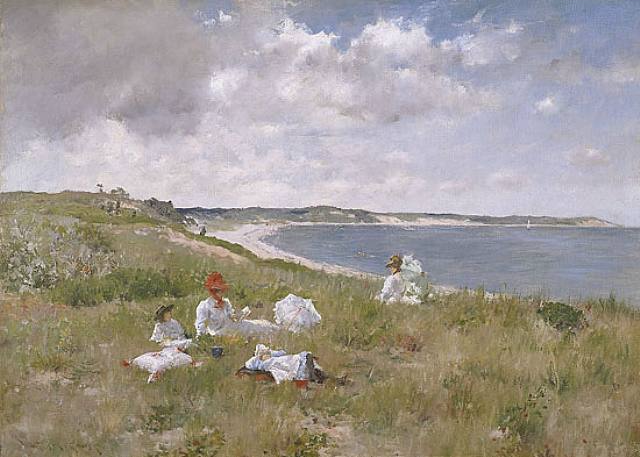
Near Sydenham Hill (1871) is an artwork by the French impressionist Camille Pissarro (1830-1903) (Southgate and Association 48). The work is oil on canvas painting with the size of 17 x 21 inches, and is located Kim bell Art Museum, Fort Worth, Texas. The painting represents a typical for impressionism scenery – a natural landscape of a suburban area near London. The scenery is mainly stationary with the only movement that can be identified is of a train moving in the middle distance. Brown shades prevail in the picture showing an abundance of shadows, indicating early spring, which contrast with the light on the field. The picture was painted at the time when Pissarro lived in London suburb during 1870 and 1871. The artist used was a supporter of a realistic depiction of landscape, where for him “a landscape on canvas must be the exact reproduction of a natural scene… “(Southgate and Association 48). He also used color, rather than lines to converge planes on the horizon, indicating infinity in the picture.
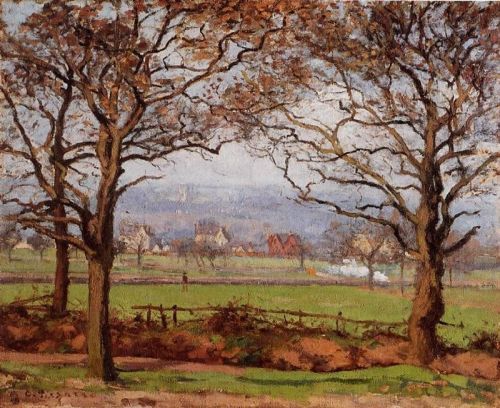
In the Greenhouse (1888) is a work by the American impressionist Dennis Miller Bunker (1861-1890) (Amon Carter Museum of Western Art, Junker and Gillham 118). The work is oil on canvas, 18 x 24 inches in size, and located in Amon Carter Museum, Fort Worth, Texas. The painting a close-up depiction of chrysanthemums in a green house. The technique used clearly demonstrates the prevalence of spontaneous and unrestrained brush strokes, and vivid colors. Bunker did not paint each flower in detail, rather than making touches of vivid color stand for the entire flower. The depicted chrysanthemums were growing in the greenhouse of Isabella Stewart Gardner, a Boston art patroness. The work was one of two painted after Bunker’s return from Europe, the other being titled Chrysanthemums, also painted in the same location. At the time, the style European exercised by Bunker was a radical departure of the academic training he received in New York and in Paris. Despite being regarded as having a suspiciously radical style, the work In the Greenhouse is considered “one of the most inventive American impressionist paintings” (Amon Carter Museum of Western Art, Junker and Gillham 118).
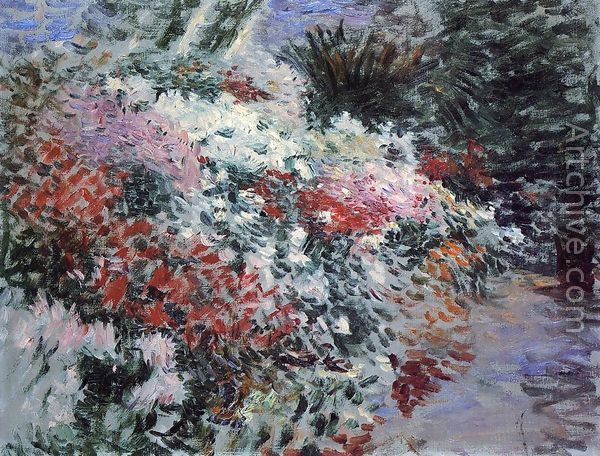
Flags on Waldorf (1916) is an artwork by the American impressionist artist Childe Hassam (1859-1935) (Amon Carter Museum of Western Art, Junker and Gillham 176). The work is oil on canvas painting, 36¼ x 30¼ in size, and located in Amon Carter Museum, Fort Worth, Texas. The style and the painting in particular are notable for many aspects, one of which is the depiction of urban sceneries, to which Hassam was drawn. The other is the flag theme, in which Flags on Waldorf is one of more than 30 canvases. Similar to other paintings in the series, Hassam used the flag as a constant in a changing scenery, in order to record the changes of the patriotic display of the Firth Avenue during World War I (Amon Carter Museum of Western Art, Junker and Gillham 176). Despite the departure of the theme of natural landscapes, the impressionism is still can be identified through the omission of contour details, in favor of brush strokes, the focus on the background, the use of interim colors to show the play of light and shadows, and others. The painting along with the whole collection represents a value in both artistic and historic terms, depicting an important period in the United States (Amon Carter Museum of Western Art, Junker and Gillham).
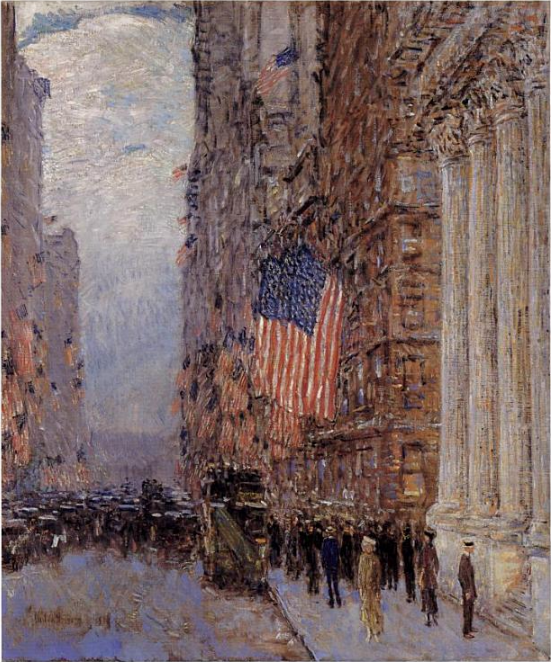
Le pont de l’Europe (The Bridge De l’Europe) (1876) is a work by the French impressionist artist Gustave Caillebotte (1848 – 1894) (Küveler). The painting is oil and canvas, 49-1/8 x 71-1/8 inches in size, and located in Petit Palais museum, Geneva (Küveler 9). The painting depicts people on the pedestrian path on the bridge. The picture’s palette can be distinguished with cool tones, and the picture is generally filled with details, unlike the rough brushstrokes of characteristic of impressionists. The use of perspectives in the picture engages the viewer into the picture, with the main them being the juxtaposition of man and technology (Küveler 9).
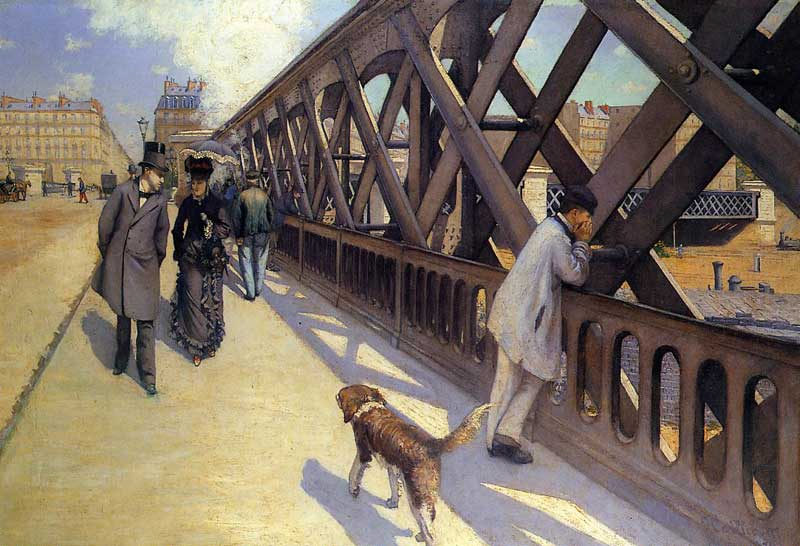
Conclusion
It can be concluded that the diversity of the described work provides an overview of impressionism. The existence of many common elements in all of the works, nevertheless, does show the diversity, and the way each artist attempted to bring something unique, either, in style, technique, or content. This tour might be useful to those interested in impressionism in art.
Works Cited
Amon Carter Museum of Western Art, P.A. Junker, and W. Gillham. An American Collection: Works from the Amon Carter Museum. Hudson Hills Press in association with the Amon Carter Museum, 2001. Print.
Artilim. “Near Sydenham Hill, Looking Towards Lower Norwood”. 2011. Artilim. Web.
Artnet. “William Merritt Chase”. 2011. Artnet.
Baker, D. Frederick. “A Painted Diary: The Landscapes of William Merritt Chase”. 2009. Antiques and Fine art.
Küveler, Jan. “Gustave Caillebotte: Painting the Enigmatic”. 2006. Ein Moderner. Web.
Lesson and Ships. “Impressionism”. n.d. Lesson and Ships.
Museum Syndicate. “The Pont Du Europe”. n.d. Museum Syndicate.
Southgate, M.T., and American Medical Association. The Art of Jama: One Hundred Covers and Essays from the Journal of the American Medical Association. Mosby. Print.
Web Gallery. “In the Greenhouse”. n.d. Web Gallery. Web.